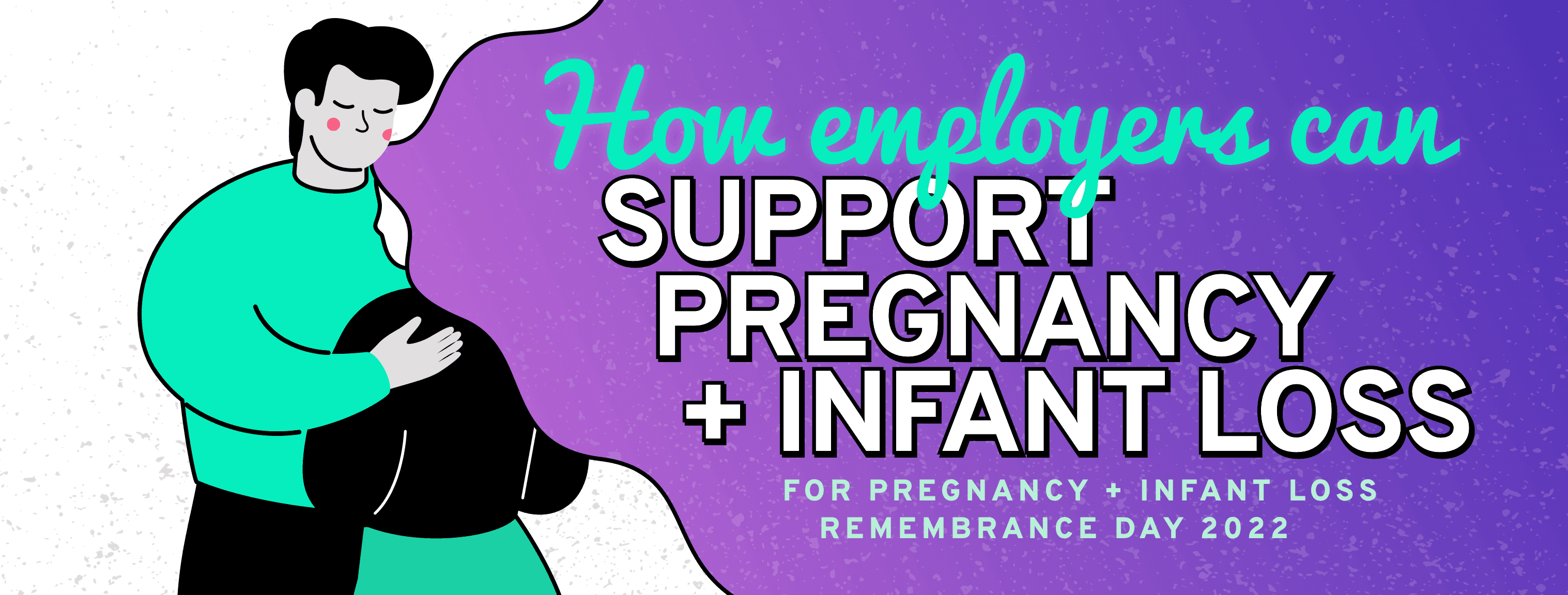How Can Employers Support Pregnancy and Infant Loss
21st Oct 2022

Every individual will handle loss differently, but grief and losing a loved one will always be an extremely difficult time. Losing a child through pregnancy or after birth is one of the most painful experiences a parent can face.
You’ll likely go through the stages of grief, from shock to denial, anger, bargaining, depression, acceptance, having hope, and then processing your grief - this process may last longer for some. Having a compassionate, understanding employer during such a dreadful time can bring comfort, knowing there is no need to stress about work or your job. Or worry about whether it could be used against you in the future for redundancy or disciplinary procedures. The main focus should be on yourself and your family.
For pregnancy and infant loss remembrance day 2022, we wanted to raise awareness not only around the cause, but around the lack of workplace support available, whilst also helping employers to recognise that pregnancy and baby loss is an important health and well-being matter.
Pregnancy and baby loss are far more widespread than you might think
Sadly, one in four pregnancies ends in loss, research from CIPD shows that support for those experiencing pregnancy and baby loss is lacking.
Losing a baby in pregnancy through miscarriage or stillbirth is still a taboo subject; it can take a toll on women, and men too - who might often be forgotten. An experience like this can also lead to mental health issues that could last for months or years.
So what can employers do to support pregnancy and infant loss?
Currently, if you are not well enough to work due to a miscarriage, you are only entitled to take sick leave. Sick leave for a miscarriage may be protected in the same way as sick leave for a pregnancy-related illness but this depends on a company's policy.
Statistics show that only 37% of employers had policies in place to support pregnancy and baby loss, with 46% of employees thinking this policy would be beneficial. Whilst data collected by CIPD states that only 25% of employees who experienced pregnancy or baby loss in the past five years received paid compassionate leave from their employer.
For those who experienced pregnancy or baby loss, 70% said they felt unsupported by their line manager. When employees did receive support from their employer, 60% noted a positive impact on their mental well-being.
Having a framework of support in place can make the world of difference during such a challenging and distressing time. Supporting an employee after a loss can help by:
- Making them feel valued
- Reducing their stress or anxiety
- Avoiding or reducing sick leave
- Keeping a good working relationship
- Building respect and loyalty
It’s crucial to communicate with your employees, ask them what support they need from you and let them know about the workplace support that you are able to provide; some women may have support from family and friends, while others may not.
What should a pregnancy and infant loss policy include?
We would always suggest seeking legal advice before creating any policy to ensure that your framework is not unlawful. Within your policy, topics you may wish to cover could include:
- Miscarriage
- Stillbirth - the loss of a baby after 24 weeks, before or during birth.
- Abortion - a medical or surgical procedure to end a pregnancy.
- Ectopic pregnancy - when a fertilised egg grows outside of the uterus.
- Molar pregnancy - a pregnancy where a non-viable fertilised egg implants in the uterus but fails to reach full term.
- Neonatal loss - the loss of a baby within the first 28 days after birth, either caused by premature birth or a genetic disorder.
Employers, who offer pregnancy loss leave?
To name a few, the following Flexified companies offer pregnancy loss leave as part of their employee offering:
Peppy
Peppy are advocates of health and well-being, it’s what they do and what they do best. They’re all about breaking down taboos and provide support to over 250 businesses.
Visit their Flexified company page to find out more about them and how they can help support your business and employees.
Juro
Their employee offering covers pregnancy loss leave amongst a long list of benefits for working parents such as enhanced maternity leave - 16 weeks full pay, 12 weeks 50% and 11 weeks statutory and enhanced paternity leave at 8 weeks full pay. Alongside adoption leave and shared parental leave. They’re showcasing the importance of inclusivity.
Take a look at their company page to find out more about them and their employee offering.
Learnerbly
Learnerbly are a diverse and inclusive employer who have cultivated this into their work culture and employee offering. Providing pregnancy loss leave, alongside enhanced sick pay, therapy support and lots more.
Visit Learnerbly’s company page to find out more.
Scout
Scout is a remote-first company with an employee offering that aligns with their values of creating happier, more productive employees. As well as offering pregnancy loss leave, Scout also offers shared parental leave, enhanced maternity leave, enhanced paternity leave and adoption leave, and a generous holiday package.
Find out more about Scout on their company page.
The lack of workplace support in place for pregnancy and infant loss shows the need for further awareness. Building awareness can ultimately help to educate and action change. We do hope to see more companies placing significance around this incredibly important matter through their workplace policies in the future.